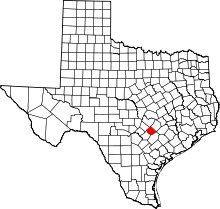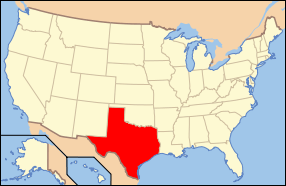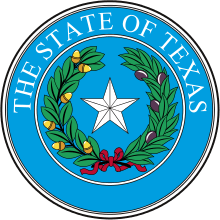Caldwell County, Texas
| Caldwell County, Texas | |
|---|---|
|
The Caldwell County Courthouse in Lockhart | |
 Location in the U.S. state of Texas | |
 Texas's location in the U.S. | |
| Founded | 1848 |
| Named for | Mathew Caldwell |
| Seat | Lockhart |
| Largest city | Lockhart |
| Area | |
| • Total | 547 sq mi (1,417 km2) |
| • Land | 545 sq mi (1,412 km2) |
| • Water | 1.9 sq mi (5 km2), 0.3% |
| Population | |
| • (2010) | 38,066 |
| • Density | 70/sq mi (27/km²) |
| Congressional districts | 27th, 35th |
| Time zone | Central: UTC-6/-5 |
| Website |
co |
Caldwell County is a county located in the U.S. state of Texas. As of the 2010 census, the population was 38,066.[1] Its county seat is Lockhart.[2] The county was founded in 1848 and was named after Mathew Caldwell, a ranger captain who fought in the Battle of Plum Creek against the Comanches and against Santa Anna's armies during the Texas Revolution. Caldwell was also a signer of the Texas Declaration of Independence.
Caldwell County is part of the Greater Austin metropolitan area.
History
- 8000 b.c. Paleo-Indians Hunter-gatherers, and later Tonkawa, Karankawa.and Comanche, first inhabitants.[3]
- 1825 Caldwell County is part of Green DeWitt's petition for a land grant to establish a colony in Texas is approved by the Mexican government.
- 1839 Edmund Bellinger becomes the first settler of Prairie Lea, the county’s oldest town. Sam Houston names the town for his future wife Margaret Lea Houston.[4][5]
- 1848 March - The legislature forms Caldwell County from Bastrop and Gonzales counties. The county seat is called Lockhart.[3][6]
- 1860 County population is 2,871. There are 1,610 slaves.[3] Community of Fentress is established, originally as Riverside, later changed to Fentress to honor the town’s first physician James Fentress.[7]
- 1861 County votes 434-188 in favor of secession from the Union. Several hundred men from Caldwell County serve in the Confederate States Army.[3]
- 1870’s St. John Colony established by former slaves.[8]
- 1874 Town of Luling is established.[9] John and James Merriwether and Leonidas Hardeman build a gristmill and a sawmill, later to be known as Zedler’s Mills.[10]
- 1887 The Missouri, Kansas and Texas completes its track between Lockhart and San Marcos.[3]
- 1889 The San Antonio and Aransas Pass Railway connects Lockhart and Luling to Shiner.[3]
- 1892 The Missouri, Kansas and Texas lays track from Lockhart east to Smithville.[3]
- 1880-1900 Tenant farming accounts for nearly half of all the county's farming and as much as 75 percent of the 3,149 farms.[3]
- 1902 The Southwest Texas Sacred Harp Singing Convention is established in McMahan.[11]
- 1922, August 9 – Edgar B. Davis discovers the Luling Oilfield.[12]
- 1927 The Luling Foundation is established by Edgar B. Davis to teach diversity in agriculture and improve the lives of farm and ranch families.[13]
- 1948 Lockhart State Park opens to the public.[14]
- 1953 Luling establishes its annual Watermelon Thump celebration.[15]
Geography
According to the U.S. Census Bureau, the county has a total area of 547 square miles (1,420 km2), of which 545 square miles (1,410 km2) is land and 1.9 square miles (4.9 km2) (0.3%) is water.[16]
Major highways
Adjacent counties
- Travis County (north)
- Bastrop County (northeast)
- Fayette County (southeast)
- Gonzales County (south)
- Guadalupe County (southwest)
- Hays County (northwest)
Demographics
| Historical population | |||
|---|---|---|---|
| Census | Pop. | %± | |
| 1850 | 1,329 | — | |
| 1860 | 4,481 | 237.2% | |
| 1870 | 6,572 | 46.7% | |
| 1880 | 11,757 | 78.9% | |
| 1890 | 15,769 | 34.1% | |
| 1900 | 21,765 | 38.0% | |
| 1910 | 24,237 | 11.4% | |
| 1920 | 25,160 | 3.8% | |
| 1930 | 31,397 | 24.8% | |
| 1940 | 24,893 | −20.7% | |
| 1950 | 19,350 | −22.3% | |
| 1960 | 17,222 | −11.0% | |
| 1970 | 21,178 | 23.0% | |
| 1980 | 23,637 | 11.6% | |
| 1990 | 26,392 | 11.7% | |
| 2000 | 32,194 | 22.0% | |
| 2010 | 38,066 | 18.2% | |
| Est. 2015 | 40,522 | [17] | 6.5% |
| U.S. Decennial Census[18] 1850–2010[19] 2010–2014[1] | |||
As of the 2010 United States Census, there were 38,066 people residing in the county. 75.8% were White, 6.8% Black or African, 0.9% Asian, 0.8% Native American, 13.1% of some other race and 2.5% of two or more races. 47.1% were Hispanic or Latino (of any race).
As of the census[20] of 2000, there were 32,194 people, 10,816 households, and 8,079 families residing in the county. The population density was 59 people per square mile (23/km²). There were 11,901 housing units at an average density of 22 per square mile (8/km²). The racial makeup of the county was 70.13% White, 8.50% Black or African American, 0.61% Native American, 0.34% Asian, 0.03% Pacific Islander, 17.66% from other races, and 2.74% from two or more races. 40.44% of the population were Hispanic or Latino of any race.
There were 10,816 households out of which 37.00% had children under the age of 18 living with them, 56.00% were married couples living together, 13.30% had a female householder with no husband present, and 25.30% were non-families. 21.20% of all households were made up of individuals and 9.40% had someone living alone who was 65 years of age or older. The average household size was 2.82 and the average family size was 3.28.
A Williams Institute analysis of 2010 census data found there were about 5.8 same-sex couples per 1,000 households in the county.[21]
In the county, the population was spread out with 28.30% under the age of 18, 8.50% from 18 to 24, 29.80% from 25 to 44, 20.80% from 45 to 64, and 12.50% who were 65 years of age or older. The median age was 34 years. For every 100 females there were 97.50 males. For every 100 females age 18 and over, there were 92.70 males.
The median income for a household in the county was $36,573, and the median income for a family was $41,300. Males had a median income of $29,295 versus $21,595 for females. The per capita income for the county was $15,099. About 10.40% of families and 13.10% of the population were below the poverty line, including 15.10% of those under age 18 and 15.40% of those age 65 or over.
Communities
Cities
- Lockhart (county seat)
- Luling
- Martindale
- Mustang Ridge (mostly in Travis County and a small part in Bastrop County)
- Niederwald (mostly in Hays County)
- San Marcos (mostly in Hays County and a small part in Guadelaupe County)
- Uhland (mostly in Hays County)
Unincorporated communities
- Dale
- Fentress
- Lytton Springs
- Maxwell
- Prairie Lea
- Pettytown (partly in Bastrop County)
- Saint Johns Colony
- Stairtown
Ghost Town
See also
- List of museums in Central Texas
- National Register of Historic Places listings in Caldwell County, Texas
References
- 1 2 "State & County QuickFacts". United States Census Bureau. Retrieved December 9, 2013.
- ↑ "Find a County". National Association of Counties. Archived from the original on 2011-05-31. Retrieved 2011-06-07.
- 1 2 3 4 5 6 7 8 Smyrl, Vivian Elizabeth. "Caldwell County, Texas". Handbook of Texas Online. Texas State Historical Association. Retrieved 1 December 2010.
- ↑ Stock, Barbara. "Prairie Lea". Handbook of Texas Online. Texas State Historical Association. Retrieved 1 December 2010.
- ↑ "Prairie Lea, Texas". Texas Escapes. Texas Escapes - Blueprints For Travel, LLC. Retrieved 1 December 2010.
- ↑ "Lockhart, Texas". Texas Escapes. Texas Escapes - Blueprints For Travel, LLC. Retrieved 1 December 2010.
- ↑ "Fentress, Texas". Texas Escapes. Texas Escapes - Blueprints For Travel, LLC. Retrieved 1 December 2010.
- ↑ "St John Colony, Texas". Texas Escapes. Texas Escapes - Blueprints For Travel, LLC. Retrieved 1 December 2010.
- ↑ "Luling, Texas". Texas Escapes. Texas Escapes - Blueprints For Travel, LLC. Retrieved 1 December 2010.
- ↑ "Zedler's Mills". Texas Escapes. Texas Escapes - Blueprints For Travel, LLC. Retrieved 1 December 2010.
- ↑ "McMahan". Texas Escapes. Texas Escapes - Blueprints For Travel, LLC. Retrieved 1 December 2010.
- ↑ Smyrl, Vivian Elizabeth. "Luling Oilfield". Handbook of Texas Online. Texas State Historical Association. Retrieved 1 December 2010.
- ↑ Parsons, Chuck; Luling Main Street (2009). "Agriculture and the Foundation Farm". Luling (Images of America). Arcadia Publishing. pp. 101–106. ISBN 978-0-7385-7145-4.
- ↑ Taylor, Tom; Molloy, Johnny (2003). "Lockhart State Park Trail". 60 Hikes within 60 Miles: San Antonio and Austin. Menasha Ridge Press. p. 88. ISBN 978-0-89732-533-2.
- ↑ Pohlen, Jerome (2006). Oddball Texas: A Guide to Some Really Strange Places. Chicago Review Press. p. 160. ISBN 978-1-55652-583-4.
- ↑ "2010 Census Gazetteer Files". United States Census Bureau. August 22, 2012. Retrieved April 20, 2015.
- ↑ "County Totals Dataset: Population, Population Change and Estimated Components of Population Change: April 1, 2010 to July 1, 2015". Retrieved July 2, 2016.
- ↑ "U.S. Decennial Census". United States Census Bureau. Archived from the original on May 11, 2015. Retrieved April 20, 2015.
- ↑ "Texas Almanac: Population History of Counties from 1850–2010" (PDF). Texas Almanac. Retrieved April 20, 2015.
- ↑ "American FactFinder". United States Census Bureau. Archived from the original on 2013-09-11. Retrieved 2011-05-14.
- ↑ Where Same-Sex Couples Live, June 26, 2015, retrieved July 6, 2015
External links
 |
Hays County | Travis County | Bastrop County |  |
| |
||||
| ||||
| | ||||
| Guadalupe County | Gonzales County | Fayette County |
Coordinates: 29°50′N 97°37′W / 29.84°N 97.61°W

